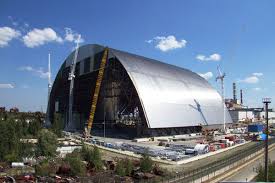Featured Galleries USUBC COLLECTION OF OVER 160 UKRAINE HISTORIC NEWS PHOTOGRAPHS 1918-1997
 Holodomor Posters
Holodomor Posters

Unique engineering feat concluded as Chernobyl arch has reached resting place
 Ceremony marks key milestone in international project
Ceremony marks key milestone in international project
to transform site of 1986 accident
EBRD, Kyiv, Ukraine, Tue, Nov, 29, 2016
 A ceremony in Chernobyl today marks the successful conclusion of the sliding operation, a key milestone before the finalisation of the international programme to transform Chernobyl into an environmentally safe and secure state by November 2017.
A ceremony in Chernobyl today marks the successful conclusion of the sliding operation, a key milestone before the finalisation of the international programme to transform Chernobyl into an environmentally safe and secure state by November 2017.
Thirty years after the nuclear disaster in Chernobyl, the radioactive remains of the power plant’s destroyed reactor 4 have been safely enclosed following one of the world’s most ambitious engineering projects.
Chernobyl’s giant New Safe Confinement (NSC) was moved over a distance of 327 metres from its assembly point to its final resting place, completely enclosing a previous makeshift shelter that was hastily assembled immediately after the 1986 accident.
The equipment in the New Safe Confinement will now be connected to the new technological building which will serve as a control room for future operations inside the arch. The New Safe Confinement will be sealed off from the environment hermetically. Finally, after intensive testing of all equipment and commissioning, handover of the New Safe Confinement to the Chernobyl Nuclear Power Plant administration is expected in November 2017.
Sir Suma Chakrabarti, EBRD President, commented: “We welcome this milestone in the process of the transformation of Chernobyl as a symbol of what we can achieve jointly with strong, determined and long-term commitment. We applaud our Ukrainian partners and the contractor and we thank all donors to the Chernobyl Shelter Fund whose contributions have made today’s success possible. The spirit of cooperation gives us confidence that the project will be completed on time and within budget a year from now.”
Novarka project director Nicolas Caille said: “We are very proud to have been able to actively contribute to meeting this one-of-a-kind technological challenge. The New Safe Confinement in Chernobyl is a feat of engineering that will ensure optimal safety conditions for the Ukrainian people for the next 100 years. I would like to take this opportunity to commend the achievement of the teams of the Novarka joint venture formed by major French groups VINCI Construction and Bouygues Construction.”
Igor Gramotkin, Director-General of the Chernobyl Nuclear Power Plant, said: “We were not building this arch for ourselves. We were building it for our children, for our grandchildren and for our great-grandchildren. This is our contribution to the future, in line with our responsibility for those who will come after us.”
The Chernobyl arch is the largest moveable land-based structure ever built, with a span of 257 metres, a length of 162 metres, a height of 108 metres and a total weight of 36,000 tonnes equipped. It will make the accident site safe and with a lifetime of 100 years allow for the eventual dismantling of the ageing makeshift shelter from 1986 and the management of the radioactive waste.
The structure was built by Novarka, a consortium of the French construction firms VINCI Construction and Bouygues Construction. Works started in 2010.
With a cost of €1.5 billion the giant structure is the most prominent element of the Shelter Implementation Plan for Chernobyl, which involved more than 300 projects and activities. The €2.1 billion programme is financed by the Chernobyl Shelter Fund. Established in 1997, the Fund has received more than € 1.5 billion from 45 donors to date. The EBRD manages the Fund and is the largest contributor to the New Safe Confinement project.
Media Advisory
High resolution photographs of the completion of sliding can be downloaded from this link:https://we.tl/vid4AcIzzz
Library shots of the work at Chernobyl, including archive pictures, can be downloaded from this Flickr album.
All photos: Mandatory credit to EBRD
High resolution time-lapse video of the sliding operation and selected rushes can be downloaded from this link: https://wetransfer.com/downloads/e62ae8fdcd9c434dd83f8669a4d53f6b20161128171237/a1ba4dbe764656d523b86dfd60b18d7e20161128171237/67a0a7
Mandatory on-screen credit to EBRD/Novarka
For any further questions, please contact:
Video: Chris Booth – chris.booth@ebrd.com or Photos: Dermot Doorly – dermot.doorly@ebrd.com
Contacts
Date: 29/11/2016
Contact EBRD London: Reiserer, Axel
Tel: 0207 338 6741
Email: axel.reiserer@ebrd.com
Contact EBRD Kiev: Anton Usov
Tel: +380 50 352 1106
Email: anton.usov@ebrd.com
Contact VINCI: Paul-Alexis Bouquet
Tel: +33 1 47 16 31 82
Email: media.relations@vinci.com
Contact BOUYGUES CONSTRUCTION: Matthieu Carré
Tel: +33 1 30 60 66 39
Email: m.carre@bouygues-construction.com











